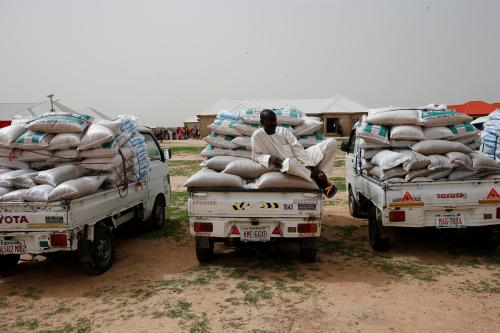Kenya and United Kingdom sign trade deal
Earlier this month, Kenya signed a trade deal with the United Kingdom, an agreement that will help Kenya avoid disruptions once the U.K. begins to transition out of the European Union on December 31. The agreement will ensure that Kenya will continue to enjoy quota-free and duty-free access to the U.K. market. The U.K. is one of Kenya’s top trading partners, as it imports a large share of Kenya’s flower and tea exports and accounts for 43 percent of its vegetable exports. The two nations trade more than $1.8 billion of goods each year, with Kenya importing primarily pharmaceuticals, electronics, machinery, and cars. Though the details were not immediately clear, there is scope for other members of the East African Community (EAC) to join the trade deal at a later date.
Kenya and Somaliland deepen diplomatic ties
Hours after Somalia announced that it was severing diplomatic ties with Kenya, Somaliland and Kenya agreed to begin direct Kenya Airways flights to the Somaliland capital of Hargeisa by March 2021. As part of the agreement, Kenya intends to set up a consulate in Hargeisa early next year. These two actions have both practical and symbolic significance. The route to Hargeisa would be the first destination for Kenya airways into a Somali area. In establishing a consulate, Kenya would join a growing list of countries—one which includes Ethiopia and Djibouti—that have set up diplomatic posts in Hargeisa.
Nigeria reopens borders
Nigeria announced Wednesday that it would be reopening its borders after a 16-month closure due to disputes over smuggling. The administration announced that the main border crossings—at Seme, Illela, Maigatari, and Mfun—would open immediately, with the rest of the borders opening by December 31. Notably, the existing bans on imports of rice, poultry, and other products will remain in place.
The closures have resulted in hits to the livelihoods of informal border traders and increases in transport costs—resulting in rises in food prices of 18 percent in November. The rise in food prices have exacerbated the economic challenges Nigeria was already facing, including a recession under COVID-19 and dropping oil prices.
Moreover, the border closures had threatened progress towards the implementation of the landmark African Continental Free Trade Agreement.
Nigerian schoolboys abducted
In other Nigeria news, on December 10, more than 100 gunmen raided the all-boys Government Science Secondary School in the state of Katsina in northwestern Nigeria, kidnapping at least 300 high school boys. By December 15, Boko Haram had claimed responsibility for the attack. Authorities believe the attack was carried out by local gangs hired by the terrorist group for the operation—breaking slightly with past school raids led by Boko Haram, like that of the Chibok girls in 2014, of whom at least 100 are still missing. Notably, the attack also took place outside of Boko Haram’s traditional stronghold in the northeastern part of the country, which security experts say hints that the group might be shifting its focus. During the attack, hundreds of schoolboys were able to escape by fleeing into the woods in the surrounding area. By Friday morning, 344 schoolboy were reunited with their families in Katsina City.
The Brookings Institution is committed to quality, independence, and impact.
We are supported by a diverse array of funders. In line with our values and policies, each Brookings publication represents the sole views of its author(s).






Commentary
Africa in the news: Kenya and Nigeria updates
December 19, 2020